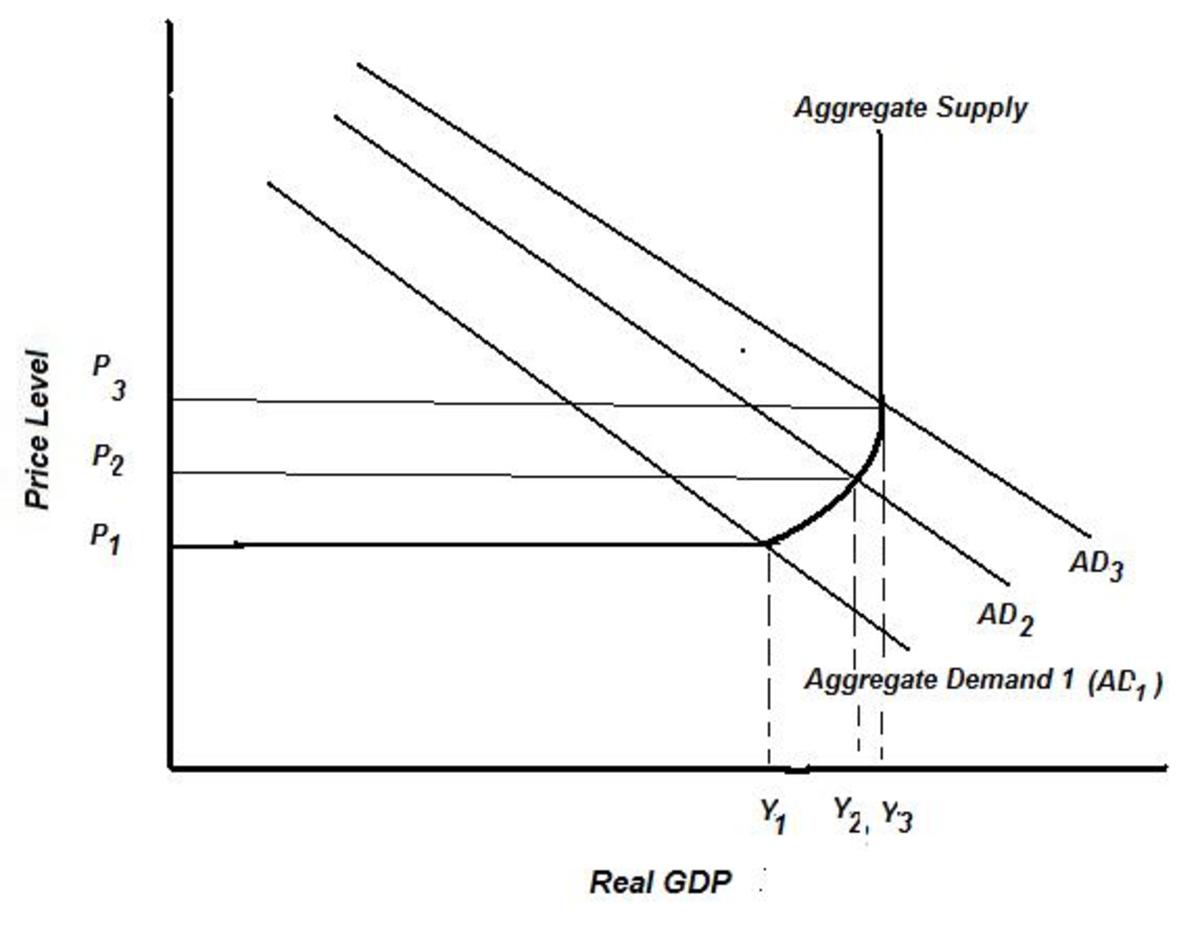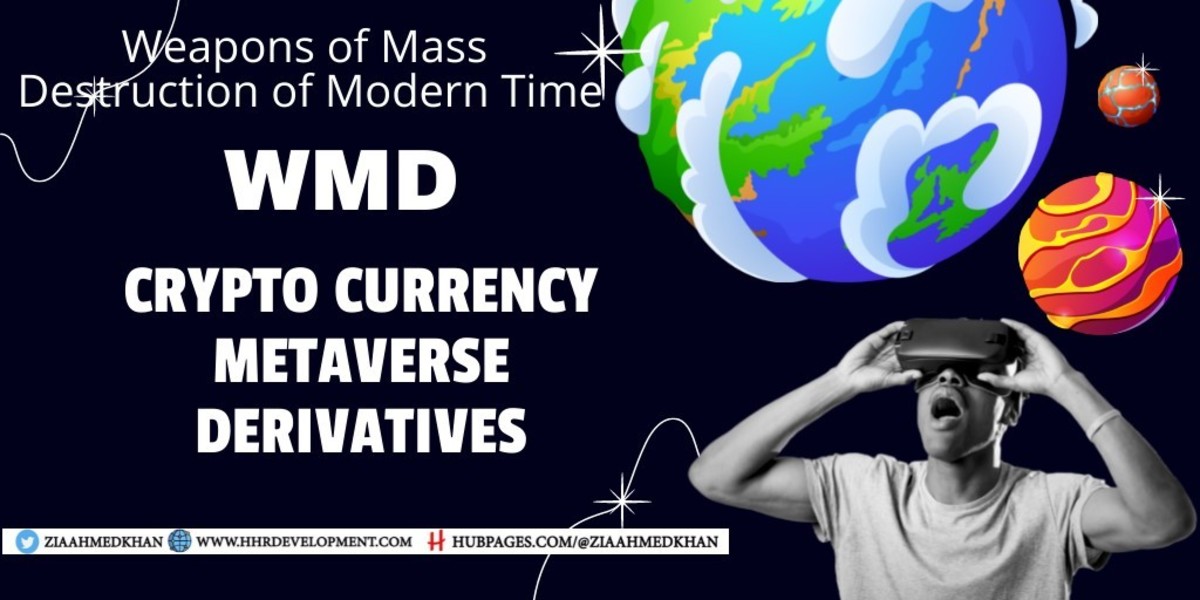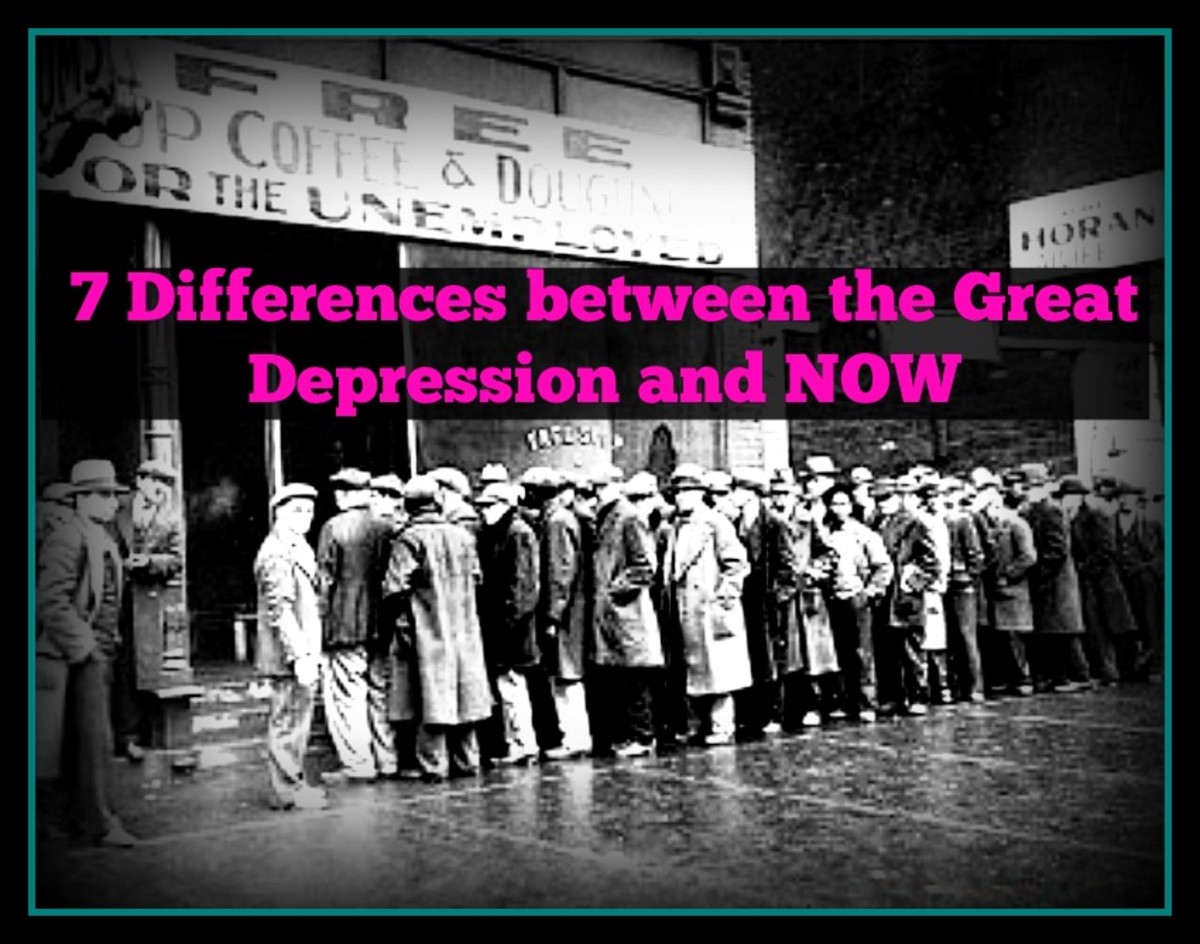What is Inflation, How is it Calculated and How Does it Affect a Nation's Economy?
Inflation is the Practice of Printing More Money than the Economy Needs
The term inflation refers to an increase in the amount of money in circulation without a corresponding increase in the amount of goods and services available to purchase with that money. Inflation always results when governments resort to printing or creating money in quantities greater than the amount of goods and services available to spend the money on.
Inflation is similar to taxes in that it gives government the money needed to spend as it wants and with this power it is able to both buy what it wants as well as influence the direction of the economy. Like taxes in which the government takes money from its citizens to spend itself, inflating the money supply by printing more money has the same effect in that it enables the government to take purchasing power from the citizens and spend it as it wishes.
A Cartoon That Provides An Excellent Explaination of Inflation
Prices are the Market's Way of Rationing Scarce Goods
As can be seen from above, scarce goods and services can only be rationed by prices effectively so long as the ratio of money in circulation to the amount of goods and services available remains relatively constant. This is why counterfeiting or the printing of official currency by individuals is illegal.
Large increases in the supply of money in circulation without a corresponding increase in availability of goods and services result in an increase in prices. If everyone has twice as much money this week than they had last week, then the first ones to the stores will be able to purchase twice as much as before leaving little for those who come later.
As people compete for the scarce goods they begin to offer to pay more in order to get what they want and in no time prices will adjust upward to the point where a balance between the money in circulation and goods available is again restored.
Today, inflation is associated with governments and rightly so, as modern governments have reserved for themselves the power to manage the money supply within their borders.
Historically, governments have claimed the exclusive right to coin money - that is produce official coins using precious metals, usually gold or silver, but modern governments have now monopolized the creation and management of the entire money supply.
Thus, in today's world, inflation is the result of deliberate manipulation of the money supply to achieve political goals of government. The currency used in the United States, and in most other nations, is known as fiat currency meaning that it is simply a piece of paper issued by the government, or government controlled central bank, which has value solely because the government says so.
In the past paper money could be exchanged for a fixed amount of a valuable commodity, usually gold but sometimes silver or another thing of value. This conversion feature limited the government's ability to increase the money supply by printing more bills.
Inflation Lesson - A Gallon of Gasoline for a Quarter
Inflation and Gold
Gold, being a highly prized metal whose supply is both limited and increases slowly, has long been used for money. Pegging money to gold, known as a gold standard, usually works to keep the money supply in balance with the goods and services available, thus keeping prices stable.
While inflation rarely occurs with a gold standard, there is at least one major instance of inflation under a gold standard and this was the inflation that swept Europe in the sixteenth century following the Spanish conquest of the Aztec and Inca Empires in the New World and the subsequent transport of boatloads of the massive gold holdings of these empires to Europe.
Spain didn't have to convert all of this gold to money. Much of flowed directly into the hands of investors who financed the expeditions and those who participated in them. Because it is coveted by all due to its value, gold can be exchanged directly in payment for purchases - coining gold as money merely facilitates exchange which can also be also accomplished by using gold itself.
Another way inflation can result while on a gold standard is through what is known as fractional reserve banking, which is the practice of backing paper money with gold but issuing more paper than there is gold to back it.
Fractional Reserve Banking
Fractional Reserve Banking is an ancient practice and can be practiced by either private banks or governments. When done in moderation this can work (modern banking systems, including that of the United States, does this using checking accounts and other financial instruments backed by a smaller supply of official currency) so long as people have confidence that they can exchange their gold backed notes for the gold backing it.
This practice of fractional reserve banking began in ancient times when people, not wanting to have to carry gold around with them or leaving it unprotected in their homes, would entrust it to a merchant who had a secure place to store it.
The merchant would issue a receipt in exchange for the physical gold and people soon found that, rather than running to the merchant to withdraw their gold every time they made a purchase, they could simply pay for their purchase by handing over their receipt for the gold rather than the gold itself.
Bank Panics
Upon discovering that most people simply exchanged receipts rather than physically claiming the gold, merchants offering secure gold depository services found they could increase their revenue by loaning out the gold and changing interest (thus earning interest on the gold they held in addition to the fees they charged to the owners of the gold for its safekeeping).
In most cases the loans consisted of a receipt for the amount borrowed rather than physically handing over the gold. Of course, if this lending became excessive people would become concerned and begin exchanging their receipts for gold.
Panics would often ensue whereby everyone rushed over to withdraw their gold and when the merchant was unable to honor all of the receipts, the holders of nonredeemable receipts would be left with worthless pieces of paper.
With the rise of banking, panics like these became known as a run on the bank. Until modern times when governments stopped backing their money with gold they found themselves in the same position when they tried to issue more currency than there was gold to back it.
As citizens and foreigners began to lose faith in the currency they would begin converting their paper money to gold thereby reducing the government's gold holdings and people's faith in the currency.
Two Definitions of Inflation
What I have described so far is the classic or historic definition of inflation. Now days when people, especially government and the media, speak of inflation they are usually referring to a rise in the price level as measured by a price index.
A price index is basically a collection of common goods and their prices. Looking at the same collection of goods and their prices in a later period (usually a month, a fiscal quarter or a year later) and comparing the new prices to the earlier prices we can see if the average of the prices in the second period has increased over the average in the first period.
If the average has increased we then say that inflation has occurred. The increase in the average may be due to an increase in the money supply or it may be due to an increase in the demand for or decrease in the supply of certain goods in the index.
If it is the latter the cause is not an increase in the money supply but is instead due to prices in the market adjusting the new supply and demand situation which, if left to itself, the market will soon correct.
The rise in prices could be caused by natural disasters such as the temporary shutting down of some of the oil refineries along the U.S. Gulf coast after they were damaged by Hurricane Katrina thereby temporarily reducing the supply of gasoline and heating oil.
The price rise could also be the result of misguided government policies such as the current sharp increase in food and fuel prices resulting from the government's ethanol mandate. Sharp increases in certain products, especially critical ones, like food or fuel, will cause the index to rise but won't cause an increase in all prices UNLESS the government attempts to ease the pain of the adjustment by printing more money in a misguided attempt to make it easier for people to pay for these items. This will result in classical inflation.
Inflation is not good for an economy, period. However, before discussing the bad effects for all which follow from long term inflation, let's first discuss the benefits that can accrue to some as a result of inflation.
Some Groups Initially Benefit from Inflation
The first beneficiary is the national government.
National governments can obtain funds in three ways - by raising taxes, by borrowing in financial markets or by simply printing money.
Taxes, of course are unpopular and, in the United States, raising taxes requires approval by Congress. Borrowing adds to the government's interest expense. Printing money is the easiest and works best when it hasn't been done for a long time thereby catching people by surprise and giving the government a larger window from which to benefit from the inflation.
Just like a counterfeiter, when a government prints money they are able to purchase more of the output of society without having to go to the trouble of collecting it in more legitimate ways.
Prior to the administration of U.S. President Ronald Reagan, which got Congress to pass a law to prevent the practice, the Federal Government used to be able to benefit from inflation in two ways. First by simply having the new money at its disposal and second by its impact on the income tax.
Prior to the Reagan Administration's reforms, tax brackets (see my hub entitled How Tax Cuts Work for an explanation of tax brackets and how they work) for income taxes remained static while inflation caused people's money incomes (money income refers to the number of dollars a person receives in income while real income refers to what those dollars will buy) to rise.
This pushed American taxpayers into higher tax brackets thereby forcing them to pay more taxes while their pre-tax spending power remained the same. This had the effect of raising taxes without appearing to do so.
Thanks to the Reagan initiated reforms, income tax brackets are now indexed for inflation and the threshold income for each bracket is now pushed up by the same amount as inflation, thereby preventing a citizen's new, inflation caused, pay increases from pushing them into a higher income tax bracket.
People who borrow money are another group who benefit from inflation initially as they are able to repay their loans with cheaper money (for example, if wages are $5 per hour it would take 20 hours of work to repay the principal on a $100 loan. However, if inflation causes wages to rise by $2.50 per hour to $7.50 the $100 loan principle can be repaid with only thirteen and one third hours of work.
Adjustable rate loans were introduced during the rampant inflation of the 1960s and 1970s as a means of leveling the playing field in this area by allowing lenders to recover inflation losses with interest rates that rose with inflation.
Professionals, like lawyers and doctors in private practice along with some small business owners who are able to raise their fees will can also benefit during the early stages of inflation by having their incomes increase with inflation while others on fixed incomes are stuck with the same wages thereby giving the first group a relative advantage over the second group in terms of being able to maintain their standard of living despite the inflation.
Renters with fixed leases benefit as their rents are fixed by the duration of the lease. Their fixed rent cost, coupled with the inflation caused rising money income, leaves renters with greater purchasing power. This benefit, of course, only lasts until the lease in renewed and their rent adjusted upward for inflation.
Some of the Many Who Lose With the Start of Inflation
Savers are one group who lose from inflation from the start. Since one of the functions of money, besides rationing scarce goods, is as a store of value whereby people can set aside the fruits of their labor and enjoy them at a later time such as after retirement or as a cushion against future tragedy. However, inflation wipes out much of this value leaving people defenseless and dependent. Modern politicians on the left like this aspect of inflation because people then become dependent upon the government for survival and this dependency not only makes people more docile in accepting government dictates but also forces them to continue to elect the politicians who control the purse strings.
Lenders are another group that loses from inflation and lenders are not just big banks but the people who deposit their savings in these banks.
People on fixed incomes, which include many retired people on fixed pensions and workers with fixed wage contracts, also lose as their incomes are fixed while prices are rising.
Landlords, a group that includes many low and middle income people who have their savings tied up in a rental property or two, lose as the rental income is fixed by the lease while taxes, insurance, maintenance and other costs of ownership rise with inflation.
Inflation Ultimately Undermines the Entire Society
In the long run everyone loses from inflation. Society is weakened as resources are directed away from productive use and into things like works of art whose value rises with inflation but doesn't serve to produce anything.
Ironically, the aesthetic benefits of art are lost, because the skyrocketing money value of the work causes it to be locked away in vaults for safety thereby denying people the pleasure of viewing it.
Savings, the foundation of economic growth is discouraged as people rush to buy now before prices rise even more (see my Hub entitled Hyperinflation in Post World War I Germany for more on this).
Alan Greenspan on Need for a Gold Standard
Continued to an extreme, inflation weakens society to the point of collapse. The present Constitution and government structure of the United States is partly the result of the rampant inflation that resulted from the habit of the Continental Congress, operating under the Articles of Confederation (our first constitution), of continually printing money needed for its spending.That government was peacefully voted out of existence when leading citizens drafted the present Constitution and presented it to the people as an alternative.
Other nations have not been so lucky. The rampant inflation in post war Germany helped pave the way for Adolph Hitler and his Nazi Party to win enough votes, not a majority but enough to give it more seats in the the Reichstag than any other party and thus able to form and lead a coalition government, and take control of the government with terrible results for the German people and the world which soon found itself in a world war.
Inflation is not good for people or for national economies, however, so long as governments are allowed to control a nation's currency, inflation will remain a fact of life. For this reason, many people prefer a return to a gold standard and allowing the market, not the government, to manage the nation's money supply.
© 2008 Chuck Nugent








